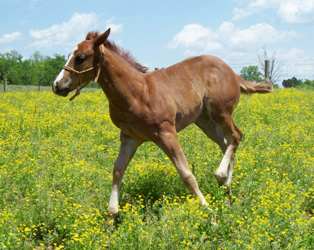Betsy Greene, Equine Extension Specialist, University of Vermont; and Pat Comerford, Equine Extension Specialist, Penn State University

Horses prefer to flee from danger, if possible. This may be in the form of a total “run off” or the horse that simply does not want to be caught. However, if flight is not an option, horses will fight to protect themselves from a perceived danger.
Horses evolved from small mammals whose survival depended on their ability to flee from predators. This basic survival mechanism still is ingrained in the modern horse. Although we have removed most of the predators from the life of the domestic horse, its first instinct when frightened is to run away from the frightening stimulus. If running is not possible then the horse resorts to biting, kicking, striking or rearing to protect itself. Many of the horse’s natural behavior patterns, such as forming herds and performing the same activities as other horses in their herd, relate directly to their prey status.
To safely work with horses, no matter what the venue – a basic understanding of behavior can aid any level of horsemen.One of the most important things to remember is that horses evolved as a prey species. That means that many of their instinctive reactions are based in a desire to protect themselves from danger.
For more information on horse behavior, check out the HorseQuest Learning Lesson: Horse Owner Survival.


